Meet Saudi Arabia's stars of social media
- Published
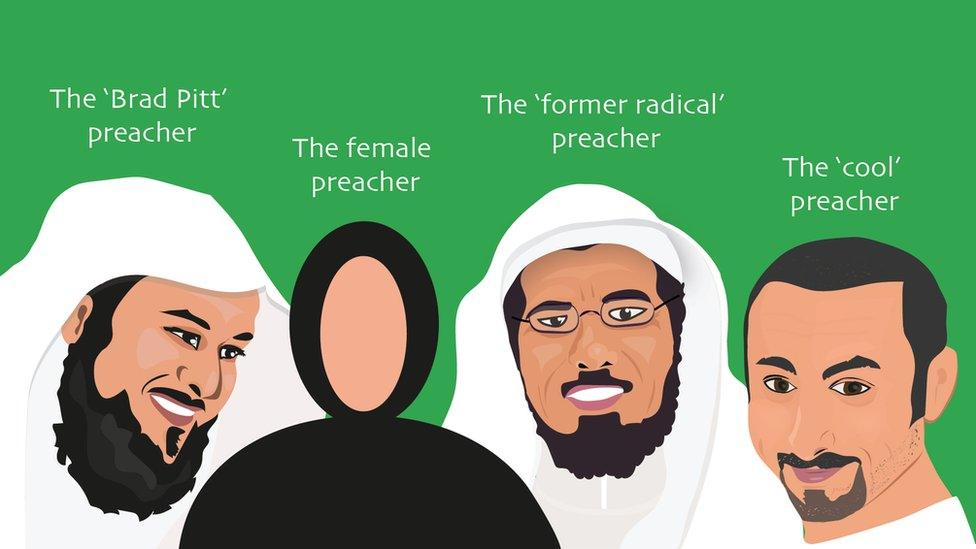
Some of Saudi Arabia's followed people on Twitter
For a nation whose king calls himself "Custodian of the Two Holy Mosques", it's probably not surprising that Saudi Arabia's "superstars" of social media are clerics. Naturally, that fame does not come without controversy. So who are these prolific religious Tweeters whose followings compare to that of pop stars and world leaders? And what do they share online? The BBC series, Saudis on Social: Faith, Freedom and Fun, looks at four of the most popular Saudi accounts on Twitter.
Mohammad Al-Arifi
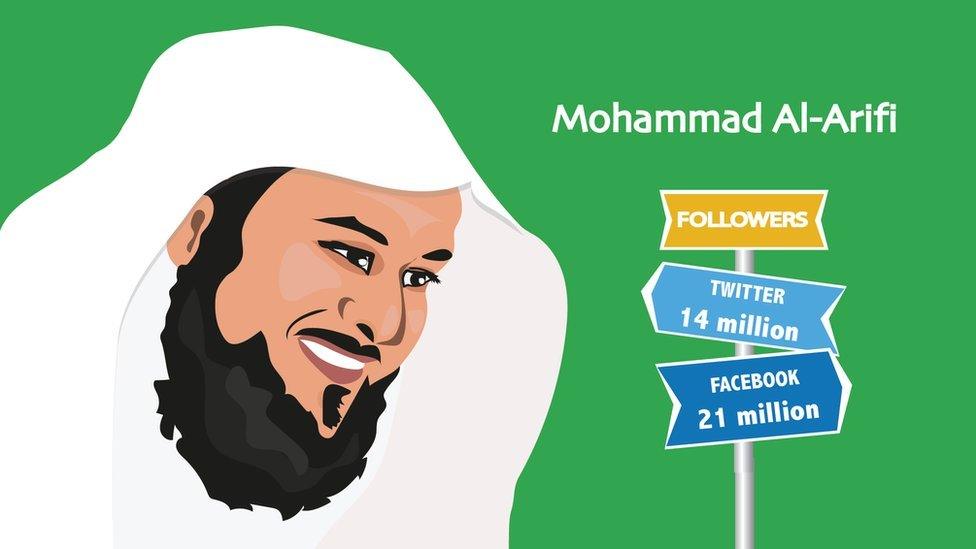
Mohamed Al-Arifi: The 'Brad Pitt' of Muslim clerics
Dubbed the "Brad Pitt" of Muslims clerics, Mohamed Al-Arifi is a leading religious figure in Saudi Arabia and the Muslim world who is known for his charismatic personality. However, his views have also embroiled him in controversy.
Some of the most controversial have related to women. In 2007, during a TV show, Arifi stated that a man was allowed to "lightly beat" his wife if she disobeyed him. And in a series of tweets in 2012, Arifi opposed the idea of allowing women to work outside their homes.
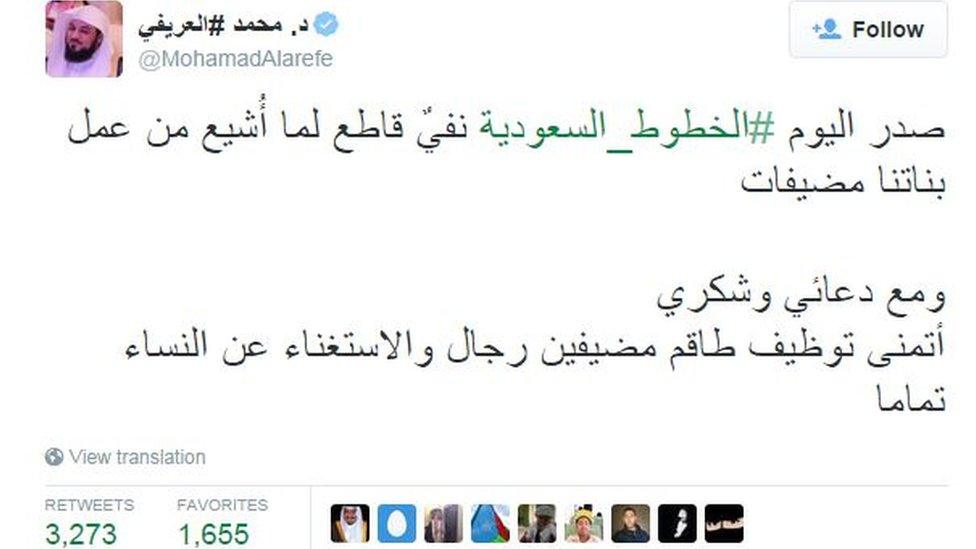
Translation: “Saudi airlines have denied employing women as air hostesses. I thank them and I hope they only employ a team of men and avoid employing women.”
Arifi is said to have a good relationship with the Saudi government and ruling family, although there have been a few hiccups. In 2014, Al-Arifi was arrested after he criticised a train network that links holy sites in the city of Mecca, which he described as "the worst in the world".
But Arifi's views are not limited to social matters. He also has a deep interest and involvement in the politics of the region. He is known for his strong views on Shia Islam and was accused of stirring sectarian tensions after reportedly saying that Shia were "nonbelievers who must be killed".
And when it comes to jihadist groups, Arifi has given contradictory opinions.
In a sermon he gave in Egypt in 2013, Arifi called for jihad (holy war) against Syrian President Bashar al-Assad. He was also forced to backtrack on comments he made in an interview in defence of al-Qaeda and its late leader, Osama Bin Laden.
The next year, he was banned from entering the United Kingdom because he was said to have preached at a mosque in Cardiff that was attended by three young Muslims who travelled to Syria to fight for so-called Islamic State (IS).
In response, Arifi denied that he might have contributed to their radicalisation and insisted that he was "vehemently opposed to the brutal methods" of IS.
Ahmed Al-Shugairi
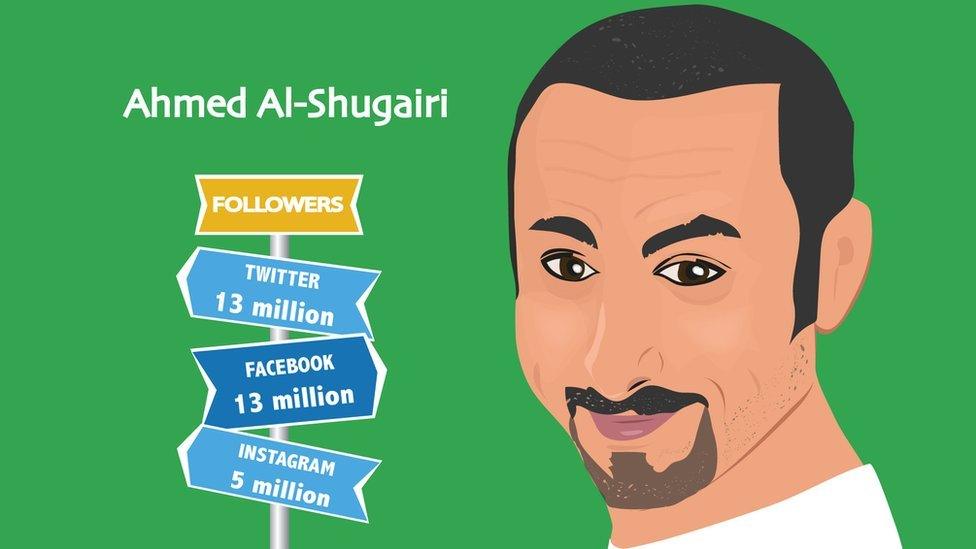
Ahmed Al-Shugairi: The 'cool' preacher
If there was ever a "cool" Muslim preacher, Ahmed Al-Shugairi would be it.
He shot to fame after the launch of his TV programme, external more than a decade ago. Jet-setting from one country to another, Shugairi was filmed travelling around the world dressed in jeans and T-shirts speaking casually about Islam.
His views and style have won him millions of young fans, who relate to his modern approach, external.
And as young people moved away from TV sets and towards social platforms, Shugairi was one of the first to catch on, enabling him to build an influential digital presence.
Despite his reluctance to label himself as a cleric, Shugairi is seen as an influential moderate voice among Muslim preachers.
But some sceptics say that what really sets the 42-year-old apart from others is style rather than ideology.
Ahmed Al-Shugairi
Liberals worry that Shugairi is an influential force for Islamising the Arab world's secular minds. Hardline clerics, however, have dismissed Shugairi as a lightweight who preaches "easy Islam".
When it comes to extremism, Shugairi's message is clear: Islam is not a religion of violence.
He believes the Saudi government's efforts to rehabilitate extremists through its prison programme has been effective. "We've seen many examples of extremists successfully rehabilitated after going through the programme," he told the BBC.
Salman Al-Odah
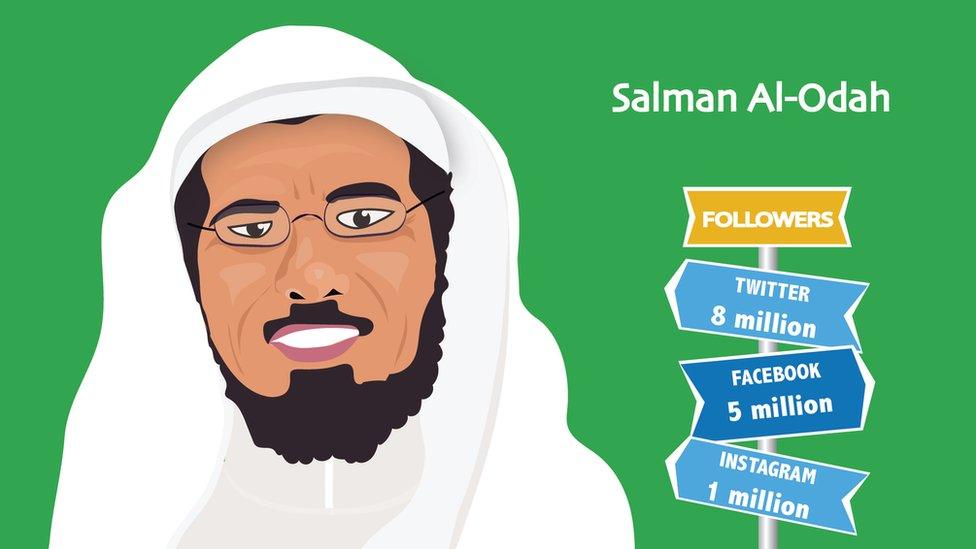
Salman Al-Odah: The 'rehabilitated' cleric
Salman Al-Odah is a leading Saudi cleric who was once known for his extreme religious views and strong anti-government position. But after a five-year prison sentence in 1994, he was completely transformed.
Odah was deemed "rehabilitated" and many said his views had changed drastically. Even though his opposition to the government has since softened, he is still capable of causing a stir.
In 2012, Odah caused controversy online after he was pictured riding a motorbike during Hajj in Mecca to avoid a traffic jam, an action seen as unbefitting of a religious leader.
Being an avid social media user himself, Odah rarely shies from expressing his views and engaging with his millions of followers, external.
In a Snapchat reply to one of his followers, external, Odah stated that men should settle for marrying only one woman, an unpopular opinion in a country where polygyny is widely practised.

But it is not just his views on women that have seen a dramatic change.
Odah has also distanced himself from violence and extremism. In his tweets and videos, he talks about "love" and "mercy", as opposed to violence.
On the sixth anniversary of 11 September 2001 attacks on the US, he delivered a speech in which he asked the late al-Qaeda leader Osama Bin Laden: "Will you be happy to meet God almighty carrying the burden of these hundreds of thousands or millions of victims on your back?"
However, Odah's views do not always win him friends. Despite his large, global fanbase, he has many critics. For them, the drastic shift in his views is a cause for doubting his credibility.
Nawal Al-Eid
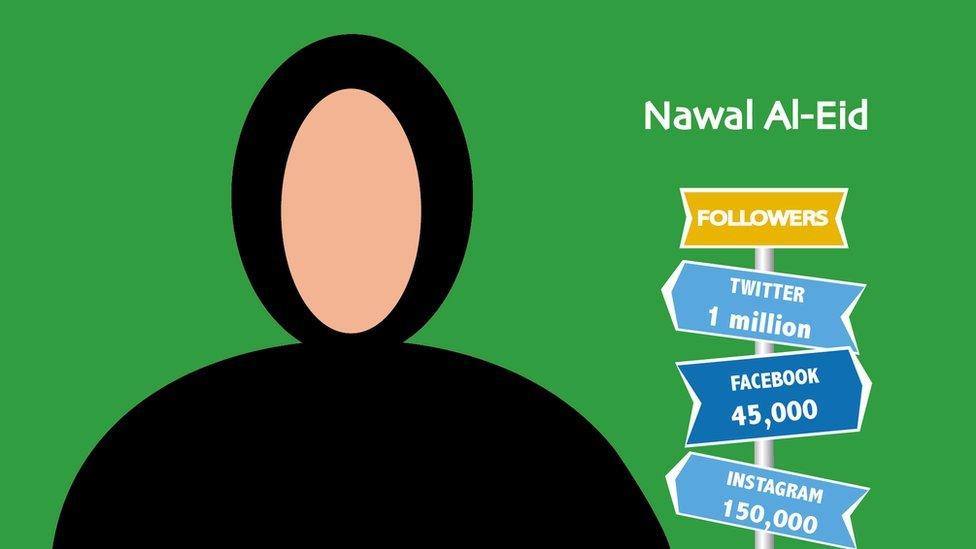
Nawal Al-Eid: the female preacher
Nawal Al-Eid is one of the most prominent female preachers in Saudi Arabia. She was voted the most influential Saudi woman on Twitter, external by a pan-Arab women's magazine. Eid never posts pictures of herself.
And while she teaches at a women's university in Ryiadh, Eid became known for hosting a popular radio show on women's rights.
Like many of her male counterparts, Eid comes from a Salafist background and her views have triggered heated debates.
In an article she wrote in 2013, external she opposed the enactment of an anti-harassment law in Saudi Arabia that meant offenders would be sentenced to one year in prison and fined up to 100,000 Saudi riyals ($27,000; £19,000).
Verbal and physical harassment is an issue women in Saudi Arabia have often complained about and are increasingly turning to social media to highlight the problem, external.
But Eid believes such laws do not address the root cause of the problem. Instead, she argues modest dress and less mixing between the genders is the solution to deterring young men from such acts.
She is also critical of embracing "Western values". She believes adhering to Islamic teachings will provide women with "adequate" rights.
In one article, entitled The Biggest Lie, external, Eid argued against equality between the sexes.
"Would a woman's frail body endure what a strong male body could?" she wrote.
Blog by Faisal Irshaid, Ahmed Nour
Additional reporting and illustrations by Mai Noman